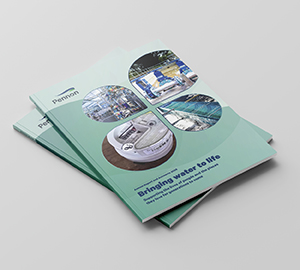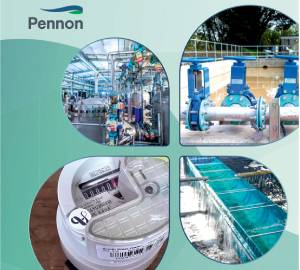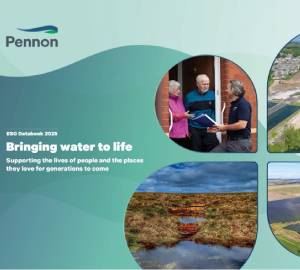Our approach to ESG ensures everything we do supports our commitment to provide environmental stewardship and to support our customers and local communities. As a responsible employer, we remain focused on employee development alongside a robust health, safety and wellbeing programme. Our activities are underpinned by a strong governance framework that upholds our core values within the organisation and throughout our supply chain.
Our ESG strategy is aligned with our business strategy, vision and values and our Group ESG policies. Our ESG Strategy is approved and monitored by or Group ESG Committee.
In 2024/25, we made significant progress on delivering our ESG commitments, achieving 13 out of 16 of our 2025 ESG targets, with significant progress on the remaining three.
Key achievements this year include reducing our Scope 2 GHG emissions by over 70%, exceeding our tree planting targets by more than 100,000 trees and delivering over £1 million in additional community investment through our social programmes across the group.
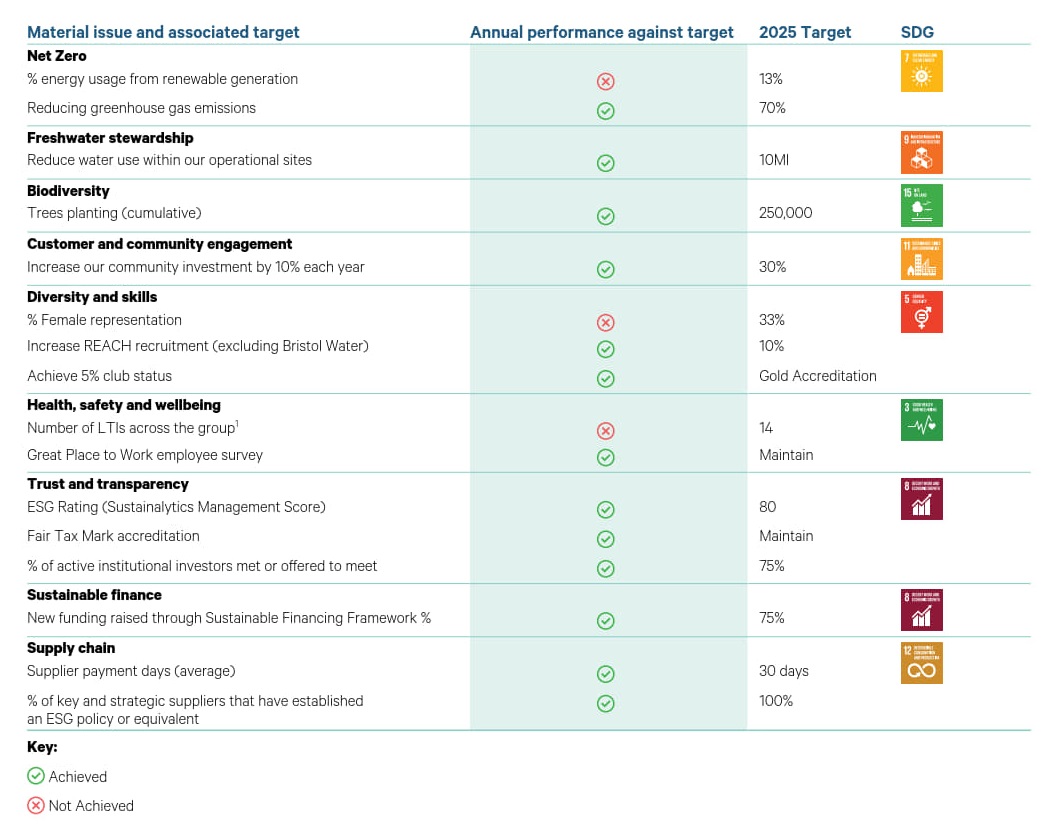
The 2025 ESG target definitions are available here
Details on our 2030 ESG Targets are available here.
For more information on our ESG performance metrics, see the ESG Databook available here.
Further details on aspects of our ESG performance including external benchmarking and assurance can be found via the tabs below whilst further details of our ESG strategy can be found on the following pages
- Double Materiality Assessment
- ESG Capitals Approach
- 2025 ESG Target Performance and Assurance
- 2030 ESG Targets
- External Benchmarking
- UN SDGs
Our 2021/22 materiality assessment engaged stakeholders to shape our ESG approach and targets up to 2025. We have now built on this approach to conduct our refreshed assessment to meet stakeholders’ expectations and adhere to both financial and impact materiality principles in-line with best practice. By applying a double materiality lens, we are assessing both the impact of material topics to Pennon and our wider environmental and social impact on these topics. This will ensure that our future ESG approach looking ahead to 2030 and beyond is ambitious, relevant, and aligned with the evolving regulatory and global sustainability trends today.
In the absence of UK-specific guidance under the forthcoming UK Sustainability Reporting Standards (UK SRS), we conducted our DMA using the European Sustainability Reporting Standards (ESRS) topic structure. This ensures alignment with current best practice and enhances consistency and comparability across our sector and beyond.
The following Materiality Matrix presents the quantitative results of our double materiality assessment (DMA), highlighting the ESG topics that stakeholders consider most material. The matrix visualises each topic based on two dimensions: impact materiality (Y-axis), reflecting the significance of Pennon Group’s impact on people and the environment, and financial materiality (X-axis), indicating the potential influence of each topic on our business operations and financial performance. Topics are colour-coded and listed below by Environmental, Social, and Governance (E, S, G) themes to provide a clear and structured view of our priority areas.
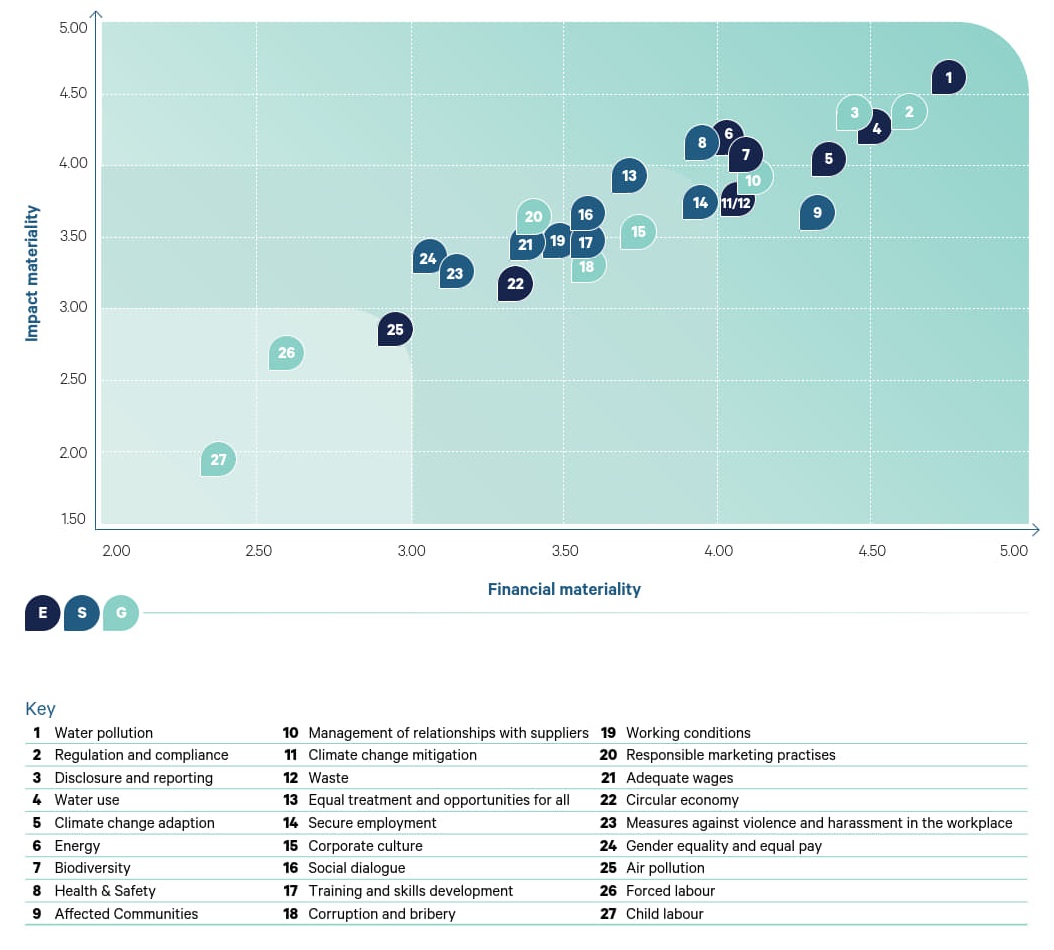
The results of our double materiality assessment reaffirm the priority ESG issues identified in our 2021/22 assessment and align strongly with the four strategic priorities that underpin our 2025-2030 Business Plan. This alignment highlights the consistency and relevance of the issues that matter most to both our stakeholders and our business. Topics such as water pollution, regulation and compliance, disclosure and reporting, water use, and climate change adaptation emerged as top priorities, reflecting the unique responsibilities and risks faced by our sector. These core areas closely align with our longstanding focus on net zero, freshwater stewardship, and building trust through transparency. The sustained importance of these issues strengthens our confidence in the direction of our ESG strategy and our ongoing commitments and actions as we look ahead to 2030 and beyond.
Creating value through our ESG approach

Everything we do links to a capital in some way, whether that is our freshwater stewardship (Natural capital), ensuring the wellbeing of our employees (Social & Human capital) or the governance we apply to how we run our business (Manufactured, Intellectual & Financial capital) – the development of our capitals framework is integral to better decision making for the future.
Our ESG capitals framework tracks a wide range of metrics to manage our capitals performance, and our materiality assessment has been fundamental in helping inform and update our future ESG targets. By taking all these factors into consideration when planning for the future, we will maximise our value and impact for each of the capitals, deliver more sustainable outcomes and make decisions based on what matters most.
Our Group ESG targets set in 2021/22 to 2025 reflect the priority issues as identified by stakeholders in our materiality assessment that are not already addressed in existing regulatory commitments and plans.
In 2024/25, we made significant progress on delivering our ESG commitments, achieving 13 out of 16 of our 2025 ESG targets, with significant progress on the remaining three.
Key achievements this year include reducing our Scope 2 GHG emissions by over 70%, exceeding our tree planting targets by more than 100,000 trees and delivering over £1 million in additional community investment through our social programmes across the group.

For more information on our ESG performance metrics, see the ESG Databook available here.
Pennon’s ESG performance and reporting is now assured by Jacobs, an independent consultancy with expertise in technical assurance for the utility sector. This limited assurance process is completed in accordance with the International Auditing and Assurance Standards Board’s (IAASB) International Standard on Assurance Engagements 3000 (ISAE 3000 (Revised) using a controls-based approach, assessing the processes, systems, and governance frameworks that underpin ESG data to ensure accuracy, consistency, and reliability.
Jacobs ESG Assurance Statement
Certain other disclosures within the Annual Report and ESG Databook that relate to the sustainability performance of South West Water and Bristol Water have also been subject to an independent audit of regulatory data conducted by Jacobs, who are engaged to independently audit technical (non-financial) data relating to our Outcome Delivery Incentives published in their Annual Performance Reports (APRs). This includes all regulatory targets, including a suite of environmental performance indicators.
This year, Turner and Townsend have conducted an independent audit of other non-financial data, also included in the APR. This includes all South West Water regulatory targets, including the suite of environmental performance indicators.
Following the acquisition of SES Water, Mott Macdonald have continued to provide independent assurance over the technical (non-financial) data across information published in the APR, including regulatory targets and performance.
Each of these assurance reports can be found in the relevant APR documents below:
www.southwestwater.co.uk/about-us/documents/Annual-reports/
www.bristolwater.co.uk/about-us/our-performance
www.seswater.co.uk/about-us/publications/our-annual-performance-report
Our Community Investment data has been assured by Business for Community Impact (B4SI).
Building on our refreshed Double Materiality Assessment’s (DMA) priority topics, we have developed ESG targets for 2025-2030 to align with our DMA findings and drive performance in areas not currently covered by existing regulatory commitments. This approach ensures that we continue to deliver against stakeholder expectations across all our key topic areas. These targets have also been shaped by a combination of ESG best practice and insights from our external ESG benchmark assessments, such as CDP and Sustainalytics.
Our refreshed targets are clear, measurable, and embedded within our governance framework, with a strong focus on driving performance where it matters most to our stakeholders:
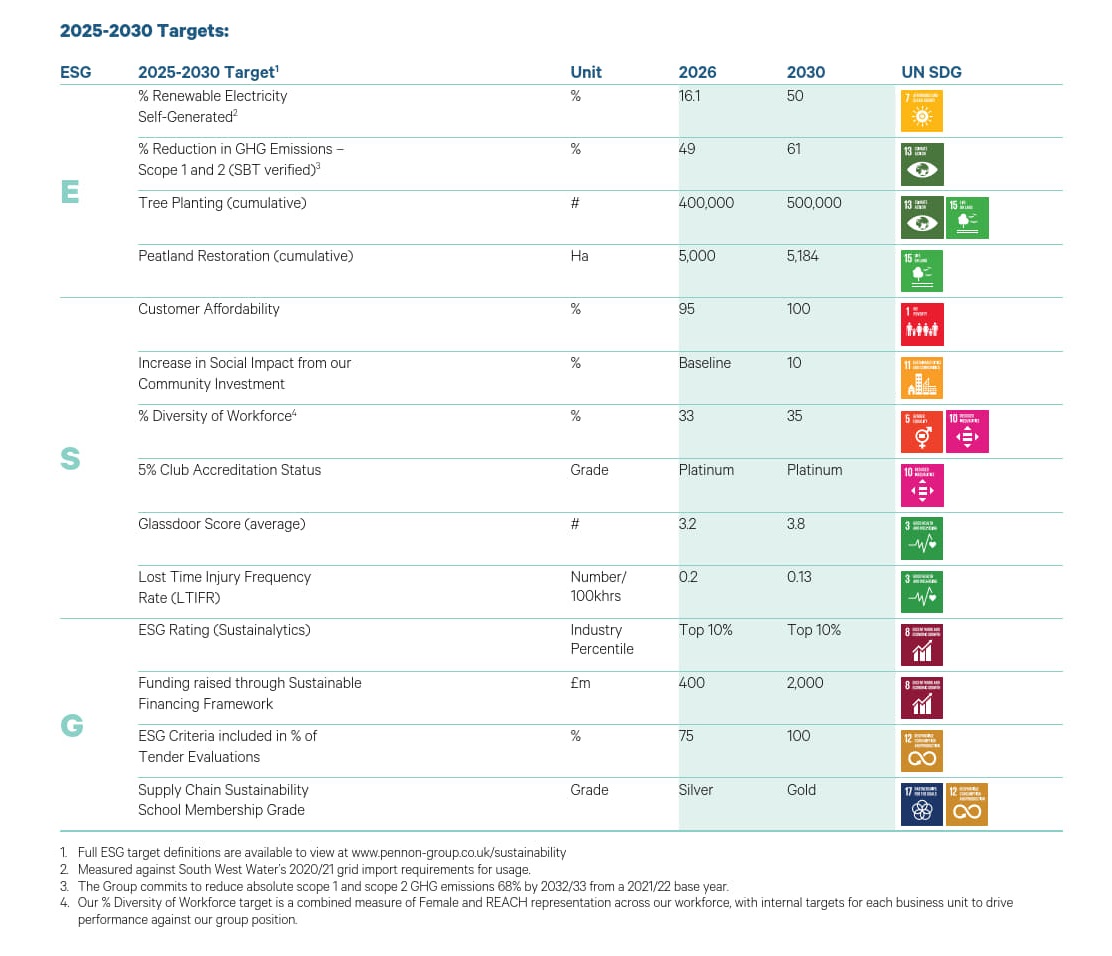
Our current ESG target definitions are available here.
Our ESG approach continues to drive positive change, embedding sustainability at the core of our business. This commitment is reflected in our leading performance across key ESG assessments, improving our scores across these key assessments as an industry leader for ESG.
This year, we achieved our highest-ever scores in both CDP’s Climate and Water questionnaires, securing A- ratings across both assessments.
Our Sustainalytics assessment achieved our highest-ever management score of 84.5, exceeding target (80) and resulting in an improved ESG risk rating of 11.7 (‘low risk’), placing Pennon Group 2nd out of 50 Water Utilities globally and has earned us Sustainalytics’ ‘ESG Top Rated’ industry badge for 2025.
Additionally, our GRESB Public Disclosure Assessment score of 93 cements our leadership position, achieving the top score amongst our industry peers.
These results reflect our unwavering commitment to sustainability, strong governance, and proactive risk management—demonstrating our leadership in ESG performance across the industry.
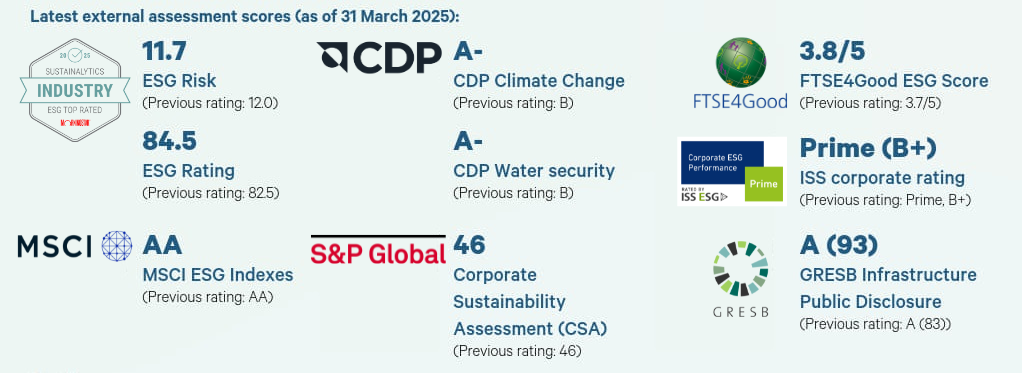
UN Sustainable Development Goals (SDGs)
We actively engage with the UN Sustainable Development Goals (SDGs) to shape our ESG approach and evaluate our impact on global sustainability outcomes. As we set new ESG targets for 2025–2030, we have mapped each target to the SDGs it most directly supports, ensuring our strategy aligns with international priorities. Our most significant contribution continues to be to SDG 6: Clean Water and Sanitation, which reflects our core purpose as a water and wastewater services provider. This commitment is further reinforced through our Double Materiality Assessment, which ensures our targets focus on the ESG topics most material to both our stakeholders and our business.

UN Global Compact
In support of the SDGs, we became a signatory of the UN Global Compact last year, joining the world’s largest corporate sustainability initiative. We are currently preparing our first Communication on Progress (CoP), which outlines how we are upholding the Compact’s Ten Principles across human rights, labour, environment, and anti-corruption. This step further strengthens our ESG governance and accountability, embedding these core principles across our operations and reporting. As part of this commitment, we will report annually on our progress, reinforcing our ambition to lead with integrity, build trust, and enhance transparency.
Our Priority Goals
We support many of UN SDGs throughout our work providing clean water and wastewater services through our businesses. Whilst we map each of our ESG Targets to the UN SDG they support, our position as a water and wastewater service provider has a significant impact upon UN SDG 6 - Clean Water and Sanitation.

- 6.1 By 2030, achieve universal and equitable access to safe and affordable drinking water for all
- 6.2 By 2030, achieve access to adequate and equitable sanitation and hygiene for all and end open defecation, paying special attention to the needs of women and girls and those in vulnerable situations
- 6.3 By 2030, improve water quality by reducing pollution, eliminating dumping and minimizing release of hazardous chemicals and materials, halving the proportion of untreated wastewater and substantially increasing recycling and safe reuse globally
- 6.4 By 2030, substantially increase water-use efficiency across all sectors and ensure sustainable withdrawals and supply of freshwater to address water scarcity and substantially reduce the number of people suffering from water scarcity
- 6.5 By 2030, implement integrated water resources management at all levels, including through transboundary cooperation as appropriate
- 6.6 By 2020, protect and restore water-related ecosystems, including mountains, forests, wetlands, rivers, aquifers and lakes
- 6.a By 2030, expand international cooperation and capacity-building support to developing countries in water- and sanitation-related activities and programmes, including water harvesting, desalination, water efficiency, wastewater treatment, recycling and reuse technologies
- 6.b Support and strengthen the participation of local communities in improving water and sanitation management
Aligning our goals with the United Nations Sustainable Development Goals
SDG 6 IN ACTION: Clean Water and Sanitation
What are we doing?
6. 5 Investing in the Centre for Resilience in Environment, Water and Waste (CREWW) partnership with Exeter University to help safeguard future water supply.
- 6.3 Improving our impact on river quality by 1/3 by 2025
- 6.4 Reducing leakage with ambitious targets throughout K8 across each of our drinking water businesses.
- 6.6 Maintaining our excellent bathing water quality standards all year round
6.1 & 6.2 & 6.a WaterAid is one of our most important partners, in 2024/25 we leveraged over £600,000 in donations to WaterAid to help reach 28,497 people with clean water, and help address water accessibility, quality and sanitation in developing countries.
6.b We are supporting our communities to increase their water efficiency through our Water Saving Community Fund whilst also running primary school education programmes that reached over 13,000 children in 2024/25 across our regions.

